
Heisman Trophy
Ticket Museum
This site is dedicated to the history of college football and its most coveted award...
The Heisman Memorial Trophy
which is presented annually to college football's most outstanding player.
The purpose of this site is to chronicle the college football season of every Heisman Memorial Trophy winner as illustrated through the beauty and artistry of game ticket stubs.
My goal is to collect a ticket stub, press pass, sideline pass, or any other form of entry to every regular season football game played during each Heisman Trophy winners Heisman Trophy winning season.
While I do prefer game ticket stubs over all other forms of entry, I will include others when I cannot find a ticket stub. I do add Bowl games and Playoff games, but they are not mandatory to the collection.
I am continually searching for the missing ticket stubs for this collection.
Please let me know if you have any of my needs available for sale or trade.
These missing tickets can be seen on each page identified with a "wanted" icon.
They can also be found in list form by clicking on the on the "TICKETS NEEDED" tab.
To date, I have acquired 860 of the 955 tickets (90%) necessary
to complete the collection between the years of 1935-2025.
Tickets beginning with the COVID-19 year of 2020 are very difficult to obtain as most schools and venues stopped printing tickets, instead going to digital formats.
I do not include any ticket from the COVID-19 year (2020) and going forward in the total
required for completion, unless I have obtained one and it as part of the collection.
That being said, on most occasion's they do exist in box office form.
I still try to obtain them when I am able to do so.
Please use the tabs below to view this collection by decade.
(for best viewing, I recommend using the desktop version, but a mobile version is also available)
I hope you enjoy this site as much as enjoy bringing it to you!
1950 Vic Janowicz - Ohio State
During his junior season in 1950, Janowich put together one of the greatest campaigns by an individual player in Ohio State history. Accounting for 16 touchdowns and 875 yards in total offense, he proved he could be a threat on both sides of the ball. One of his masterful performances
occurred in a game against Iowa, in which he ran for two touchdowns and threw for four more in an Ohio State 83-21 victory. He completed five-of-six passes for 128 yards in the Buckeye win and also set a Big Ten record with 10 extra points. But perhaps even more amazing was the Michigan game, now called the Snow Bowl of 1950, in which Janowicz kicked a 27-yard field goal into blizzard-like conditions. His 21 punts for 685 yards set two more school records that day.

On December 5, 1950, Vic Janowicz was awarded the Heisman Trophy. In doing so he became Ohio State's second Heisman winner. His senior year of 1951 wasn't nearly as successful. A new coach, Wood Hayes, altered the offense and Janowicz's role was reduced by this and also by injuries. Janowicz passed up offers to play professional football in order to pursue a baseball career. He reached the major leagues with the Pittsburgh Pirates, but only hit .214 over two seasons as a bench player. He returned to football late in the 1954 season with the Washington Redskins. During training camp in 1956, he suffered a serious brain injury in a auto accident that left him partially paralyzed and ended his athletic career.
Vic Janowicz was elected into the College Football Hall of Fame in 1976.
Victor Felix Janowicz (February 26, 1930 - February 27, 1996)


10/7/1950 vs. Pittsburgh
(W 41-7)
(attendance 73,137)
9/30/1950 vs. S.M.U. (Press Box) (ticket stub still wanted)
(L 27-32)
(attendance 80,672)

10/14/1950 at Indiana
(W 26-14)
(attendance 29,000)

10/21/1950 at Minnesota
(W 48-0)
(attendance 52,115)

10/28/1950 vs. Iowa
(W 83-21)
(attendance 82,174)
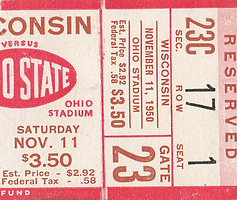
11/11/1950 vs. Wisconsin
(W 19-14)
(attendance 81,535)

11/4/1950 at Northwestern
(W 32-0)
(attendance 50,000)
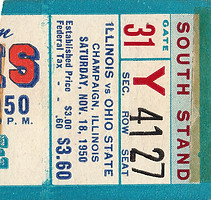
11/18/1950 at Illinois
(L 7-14)
(attendance 71,118)

11/25/1950 vs. Michigan (full ticket)
(L 3-9)
(attendance 50,503)
1951 Dick Kazmaier - Princeton
The 5-11, 171-pound Kazmaier was a halfback, kicker and quarterback for the Tigers. He spent his first tear at Princeton fifth on the depth chart. Within two years, however, he became the ultimate weapon in the single-wing offense of Hall of Fame head coach Charlie Caldwell. His career was capped in 1951 as he was named an All American as well as winning the Maxwell award. He was the nation's total offense leader in 1951 and the most accurate passer in the country. He rushed for 861 yards and nine touchdowns while throwing for 966 yards and 13 scores. He was named Ivy League Football Player of the Decade in 1960 and Time Magazine ran his picture on the cover. Princeton went 18-0 over his final two years, and it won the 1950 national championship based on both the Boand and Poling final polls.

On December 4, 1951, Dick Kazmaier was awarded the Heisman Trophy. Kazmaier won Princeton's only Heisman Trophy and was the last recipient from an Ivy League school. The Chicago Bears drafted him in the 1952 draft, but he declined to play professional football, instead going to Harvard Business School. After spending three years in the Navy (1955-1957) and attaining the rank of lieutenant, he founded Kazmaier Associated, Inc, an investment firm in Concord, Massachusetts. Kazmaier served as a Trustee of Princeton University and as chairman of the President's Council on Physical Fitness and Sports under President Ronald Reagan.
Dick Kazmaier was elected into the College Football Hall of Fame in 1976.
Richard William Kazmaier (November 23, 1930 - August 1, 2013)

9/29/1951 vs. New York University
(W 54-0)
(attendance 12,000)

10/13/1951 at Pennsylvania
(W 13-7)
(attendance 60,000)

10/27/1951 vs. Cornell
(W 53-15)
(attendance 49,000)
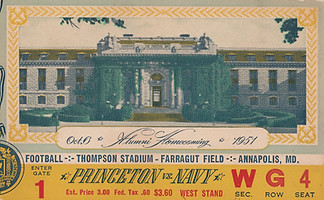
10/6/1951 at Navy
(W 24-20)
(attendance 21,000)

10/20/1951 vs. Lafayette
(W 60-7)
(attendance 15,000)

11/3/1951 vs. Brown (press ticket)
(ticket stub still wanted)
(W 12-0)
(attendance 21,000)

11/10/1951 at Harvard
(W 54-13)
(attendance 22,000)

11/24/1951 vs. Dartmouth
(W 13-0)
(attendance 27,000)

11/17/1951 vs. Yale
(W 27-0)
(attendance 45,000)

12/11/51 Heisman Ceremony ticket stub
1952 Billy Vessels - Oklahoma
Born in Cleveland, Oklahoma, as a young boy Billy would hitchhike 50 miles on football Saturday's to see Oklahoma A&M play in Stillwater, and he sometime's served as the teams water boy. By the time Vessels was a high school football star, the Oklahoma program was thriving under head coach Bud Wilkinson, and he became a Sooner. The 6-foot, 190 pound Vessels might have won the Heisman Trophy based on his huge game against Notre Dame in November, 1952. The game was telecast nationally and was broadcast on radio by Mel Allen. Vessels ran for 195 yards on 17 carries and scored on a pass reception and two long runs, but he also fumbled late in the game at the Notre Dame 20 yard line. Notre Dame, a heavy underdog, won by a score of 27-21, handing Oklahoma its only loss of the season, but Vessels performance brought him national acclaim.
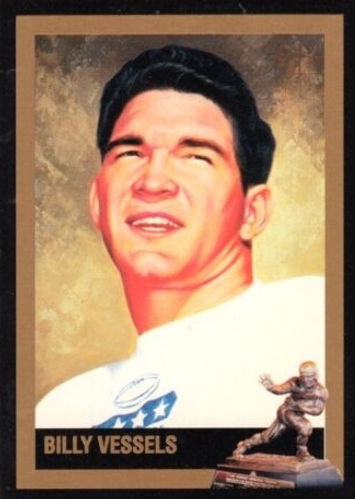
On November 25, 1952, Billy Vessels was awarded the Heisman Trophy, the first for Oklahoma. He is the first receipient to rush for over 1,000 yards. Vessels is also the first T-formation running back to win the award. During the 1952 season, Vessels rushed for 1,072 yards including seven 100-yard performances and 18 touchdowns. He was the No. 1 draft pick of the Baltimore Colts in 1953, but he accepted an offer from the Edmonton Eskimos of the Canadian League. He won the Schenely Award as Canada's top pro player in his rookie year, then entered the Army, where he played football. Vessels finally joined the Baltimore Colts in 1956. Late in the season, he ran for three touchdowns against the Los Angeles Rams but was hampered by injuries. Vessels retired at the end of the 1956 season.
Billy Vessels was elected into the College Football Hall of Fame in 1974.
Billy Dale Vessels (March 22, 1931 - November 17, 2001)
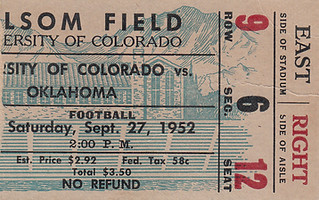
9/27/1952 at Colorado
(T 21-21)
(attendance 30,569)

10/11/1952 vs. Texas (at the Cotton Bowl)
(W 49-20)
(attendance 75,504)

10/25/1952 vs. Kansas State
(W 49-6)
(attendance 38,168)

11/8/1952 at Notre Dame
(L 21-27)
(attendance 57,466)

11/22/1952 vs. Nebraska
(W 34-14)
(attendance 42,489)

10/4/1952 vs. Pittsburgh
(W 49-20)
(attendance 37,716)

10/18/1952 at Kansas
(W 42-20)
(attendance 37,946)

11/1/1952 at Iowa State
(W 41-0)
(attendance 9,619)

11/15/1952 vs. Missouri
(W 47-7)
(attendance 43,393)

11/29/1952 at Oklahoma A&M
(W 54-7)
(attendance 21,408)
1953 Johnny Lattner - Notre Dame
The only player to win the Heisman who was born and raised in Chicago, Lattner starred as a single-wing tailback at Fenwick High School. Johnny originally favored attending Michigan because the Wolverines also ran the single-wing while Notre Dame ran the T-formation. But the challenge of playing for the Irish was too appealing for Lattner, who joined Frank Leahy's squad in 1950. by 1953, the Irish were looking for better results than the 7-2-1 of 1952, and Leahy was counting on Lattner to return them to glory. In turn, Johnny Lattner did it all, carrying 134 times for 651 yards, just shy of five yards per carry. He caught 14 passes for 214 yards, 14.6 yards per reception, he returned eight kickoffs for 40 yards per return and brought back 10 punts for a symmetrical 10 yards per return. Lattner also added four interceptions while playing on defense.
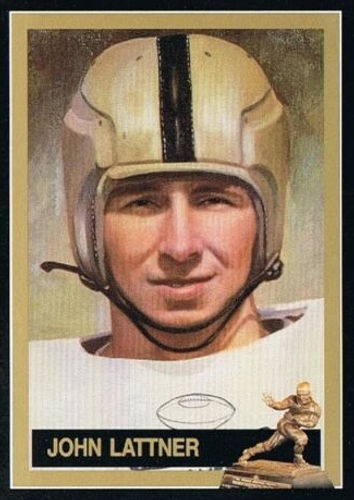
On December 1, 1953, Johnny Lattner was awarded the Heisman Trophy, the fourth such award in Notre Dame history. In what was the second-closest Heisman balloting in history, Johnny topped Paul Giel of Minnesota by only 56 points. Lattner claimed the Heisman Trophy despite the fact he didn't lead the Irish in rushing, passing, receiving, or scoring. He again won the Maxwell Award while being named All-American for the second-straight year. Lattner played one year of professional football with the Pittsburgh Steelers before entering the Air Force for two years, during which he suffered a career ending knee-injury in a military game. A former restaurant owner in Chicago, he went on to become an executive for a business forms company.
Johnny Lattner was elected into the College Football Hall of Fame in 1979.
John Joseph Lattner (October 24, 1932 - February 16, 2016)

5/2/1953 vs. Notre Dame Old Timers

9/26/1953 at Oklahoma
(W 28-21)
(attendance 59,500)

10/17/1953 vs. Pittsburgh
(W 23-14)
(attendance 57,998)
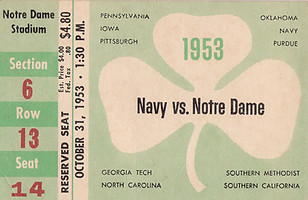
10/31/1953 vs. Navy
(W 38-7)
(attendance 58,154)

11/14/1953 at North Carolina
(W 34-14)
(attendance 43,000)

11/28/1953 at Southern California
(W 48-14)
(attendance 97,952)

10/3/1953 at Purdue
(W 37-7)
(attendance 49,135)

10/24/1953 vs. Georgia Tech
(W 27-14)
(attendance 58,254)

11/7/1953 at Pennsylvania
(W 28-20)
(attendance 69,071)

11/21/1953 vs. Iowa
(T 14-14)
(attendance 56,478)

12/5/1953 vs. Southern Methodist
(W 40-14)
(attendance 55,522)

1953 Student Season Ticket
1954 Alan Ameche - Wisconsin
Born in Italy, Ameche grew up in Kenosha, Wisconsin where he was an all-state fullback at Bradford High. At age 16, he changed his birth name Lino to Alan. He was heavily recruited by Notre Dame, but signed with Wisconsin. Due to the Korean War, freshman were eligible, which meant that Ameche played right away in 1951. that year, he broke the Wisconsin single-season rushing mark with 774 yards and was named to the All-Big-Ten Team. In 1952, he broke his own mark, rushing for 946 yards as the Badgers made it to the Rose Bowl. He rushed for 133 yards in the 7-0 loss to USC. In 1953 when rule changes made it necessary for him to be an all-purpose player, Ameche played defense with such ferocity that he ended up playing 55 minutes or more each game earning him the nickname "The Iron Horse". Ameche earned All-American honors for the third time as a senior, rushing for 641
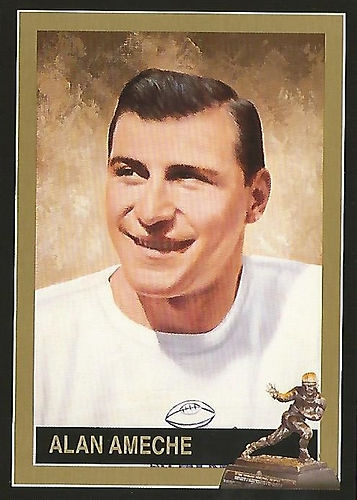
yards and nine touchdowns while again playing both ways.
On November 25, 1954, Alan Ameche was awarded the Heisman Trophy, the first Wisconsin player to garner the award.
Drafted by Baltimore, he turned down a lucrative offer to join the pro wrestling tour and signed with the Colts. He led the NFL in rushing his first season and was named Rookie of the Year. Ameche played as a fullback with the Colts for six seasons (1955-1960) where he earned Pro Bowl honors in each of his first four seasons. He is famous for scoring the winning touchdown in overtime in the 1958 NFL Championship Game against the New York Giants, labeled as "The Greatest Game Ever Played". Afterwords, Ameche founded Gino's, Inc. and served as its Corporate Secretary and a member of the board.
Alan Ameche was elected into the College Football Hall of Fame in 1975.
Alan Ameche (June 1 1933 - August 8, 1988)

9/25/1954 vs. Marquette
(W 52-14)
(attendance 52,819)

10/9/1954 vs. Rice
(W 13-7)
(attendance 52,819)

10/23/1954 at Ohio State
(L 14-31)
(attendance 82,636)

10/2/1954 at Michigan State
(W 6-0)
(attendance 51,194)

10/16/1954 vs. Purdue (full ticket)
(W 20-6)
(attendance 53,131)

10/30/1954 at Iowa
(L 7-13)
(attendance 52,185)

11/6/1954 vs. Northwestern
(W 34-13)
(attendance 53,131)

11/13/1954 at Illinois (full ticket)
W 27-14)
(attendance 71,119)

11/20/1954 vs. Minnesota
(W 27-0)
(attendance 53,131)

1954 Season Ticket Book (full)
1955 Howard Cassady - Ohio State
Born in Columbus, Ohio, Cassady attended Central High School. Ohio State was in his blood - as a bot, he would sneak into Ohio Stadium to watch the Buckeyes play - so there was little doubt which college he would attend. It didn't take OSU fans long to realize why Howard "Hopalong" Cassady was something special. In his first college game, the season opener against Indiana in 1952, the 150-pound freshman came off the bench to score three touchdowns and lead the Buckeyes to a 33-17 victory. From then on "Hop" was a regular in the OSU lineup playing in 36 of a possible 37 games and leading the Buckeyes to a 29-8 record over the next four years. In 1954, Cassady won unanimous All-America honors and helped the Buckeyes to a 10-0 record and a convincing 20-7 win over USC in the Rose Bowl.

Cassady again won All-America honors in 1955 when he rushed for 958 yards and 15 touchdowns. He also played baseball for the Buckeyes, starting at shortstop for three seasons.
On November 29, 1955, Howard "Hopalong" Cassady was awarded the Heisman Trophy. After graduation, Cassady was the first round pick of the NFL's Detroit Lions. He played defensive back for Detroit, Cleveland, and Philadelphia before retiring after eight seasons. "Hop" who lived in Tampa in his later years, spent many summers in Columbus as a coach with the Columbus Clippers, the Yankees AAA farm club. OSU retired his jersey number "40" November 18, 2000.
Howard "Hopalong" Cassady was elected into the College Football Hall of Fame in 1979.
Howard Albert "Hopalong" Cassady (March 2, 1934 - September 20, 2019)

9/24/1955 vs. Nebraska
(W 28-20)
(attendance 80,171)
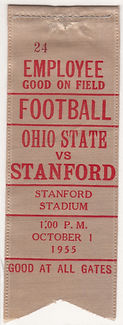
10/1/1955 at Stanford (employee ribbon)
(ticket stub still wanted)
(L 0-6)
(attendance 28,000)

10/8/1955 vs. Illinois
(W 27-12)
(attendance 82,407)

10/22/1955 at Wisconsin
(W 26-16)
(attendance 53,529)

11/5/1955 vs. Indiana
(looking to replace this stub)
(W 20-13)
(attendance 80,730)
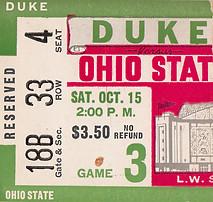
10/15/1955 vs. Duke
(L 14-20)
(attendance 82,254)

10/29/1955 vs. Northwestern
(W 49-0)
(attendance 82,214)

11/12/1955 vs. Iowa
(W 20-10)
(attendance 82,701)

11/19/1955 at Michigan
(W 17-0)
(attendance 97,369)
1956 Paul Hornung - Notre Dame
A superb all around athlete, Hornung starred at Bishop Benedict Joseph Flaget High in Louisville, Kentucky where he lettered four years each in football, basketball, and baseball. He was recruited by Kentucky head coach Bear Bryant, but chose to attend Notre Dame instead. As a junior he finished fourth nationally in total offense with 1.215 yards and fifth in the Heisman voting behind Ohio State's "Hopalong" Cassady. In a loss to USC, he accounted for 354 yards of offense, an NCAA high that season. As a senior, the "Golden Boy" carried the ball 94 times for 420 yards and completed 59 of 111 passes for 917 yards, three touchdowns. He accounted for more than half of the Irish scoring-and converted 67 times on third or fourth down as a junior and senior combined.
On December 5, 1956, Paul Hornung was awarded the Heisman Trophy.

He is the only Heisman winner to win the trophy while playing for a losing team. He won the award over Tennessee's Johnny Majors and Oklahoma's Tommy McDonald, who actually garnered more first place votes. As a bonus pick of the Green Bay Packers, he led the NFL in scoring in 1959, '60, and '61. Hornung won the NFL's Most Valuable Player award for the 1961 season. He played on Packers teams that won four NFL titles and the first Super Bowl, although he was the only Packers player to not play in the game, due to a pinched nerve. Hornung retired after the '66 season, as physical problems kept him from joining the New Orleans Saints as an expansion pick. He then embarked on a career in broadcasting, both in the WFL and the NFL.
Paul Hornung was enshrined in the Pro Football Hall of Fame in 1986. He was also elected into the College Football Hall of Fame in 1985.
Paul Vernon Hornung (December 23, 1935 - November 13, 2020)

9/22/1956 at S.M.U.
(L 13-19)
(attendance 61,000)

10/13/1956 vs. Purdue
(L 14-28)
(attendance 58,778)

10/27/1956 vs. Oklahoma
(L 0-40)
(attendance 60,128)

11/10/1956 at Pittsburgh (full ticket)
(L 13-26)
(attendance 58,697)

11/24/1956 at Iowa
(L 8-48)
(attendance 56,632)

10/6/1956 vs. Indiana
(W 20-6)
(attendance 58,372)

10/20/1956 vs. Michigan State
(L 14-47)
(attendance 59,378)

11/3/1956 at Navy
(L 7-33)
(attendance 57,773)

11/17/1956 vs. North Carolina
(W 21-14)
(attendance 56,793)
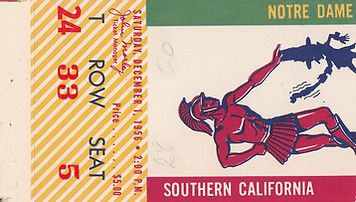
12/1/1956 at Southern California
(L 20-28)
(attendance 64,538)
1957 John David Crow - Texas A&M
One of the most decorated student-athletes at Texas A&M, Crow grew up in Springhill, Louisiana where he earned All-America honors in football and also lettered in basketball and track. He was recruited to Texas A&M by head coach Paul "Bear" Bryant and came to campus as a true freshman in 1954. Crow was remarked how thankful he was that he did not have to attend the notorious football camp in Junction since freshman were ineligible at that time. In addition to playing running back he also played defensively as was known for his tough, physical style of play. Crow earned three letters under coach Bryant from 1955-57. In 1957, he and his teammates helpped the Aggies reach No. 1 in the polls and he rushed for 562 yards and six touchdowns, caught two passes, and threw five touchdown strikes.

On defense, he had five interceptions. Bryant told Heisman voters that "they should do away with the thing" if they didn't vote for Crow.
On December 3, 1957, John David Crow was awarded the Heisman Trophy over Alex Karras of Iowa. The second player selected overall in the 1958 NFL draft by the Chicago Cardinals, Crow played 11 seasons in the NFL He was named to four Pro_bowl squads as well as the all-decade team of the 1960's as a halfback. After his playing career, Crow went into coaching. He began with coach Bryant on the Alabama coaching staff. He also coached in the NFL with both the Cleveland Browns and the San Diego Chargers. He was later named head coach at Louisiana-Monroe.
John David Crow was elected into the College Football Hall of Fame in 1976.
John David Crow Sr. (July 8, 1935 - June 17, 2015)

9/21/1957 vs. Maryland (at Cotton Bowl)
(W 21-13)
(attendance 25,000)

10/5/1957 vs. Missouri (Photographer's Booth)
(W 28-0)
(attendance 26,250)

10/19/1957 at T.C.U.
(W 7-0)
(attendance 46,000)

10/26/1957 vs. Baylor
(W 14-0)
(attendance 42,000)

11/2/1957 at Arkansas
(W 7-6)
(attendance 31,000)
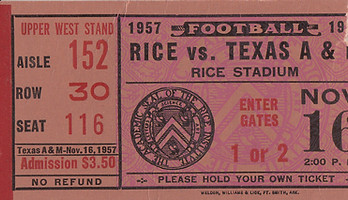
11/16/1957 at Rice
(L 6-7)
(attendance 72,000)

9/28/1957 at Texas Tech
(W 21-0)
(attendance 27,000)

10/12/1957 vs. Houston
(W 28-6)
(attendance 33,000)
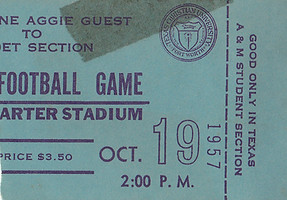
10/19/1957 at T.C.U.
(student ticket)
(W 7-0)
(attendance 46,000)

10/26/1957 vs. Baylor (side line pass)
(W 14-0)

11/9/1957 vs. S.M.U.
(W 19-6)
(attendance 28,000)
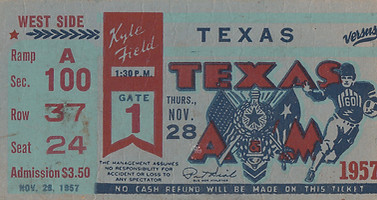
11/28/1957 vs. Texas
(L 7-9)
(attendance 42,000)
1958 Pete Dawkins - Army
Accepted by Yale University, Dawkins chose instead to attend the United States Military Academy at West Point. He earned high honors, serving as First Captain, president of his class, captain of the football team, and a "Star Man" in the top five percent of his class academically. A cadet is considered outstanding if he attains one of these positions. Dawkins was the only cadet in history to hold all four at once. As a senior, Dawkins rushed for 428 yards and five touchdowns, caught another six TDs through the air and totaled another 294 yards on punt and kick returns. He finished with 1,216 all-purpose yards and 12 total touchdowns as Army finished the season 8-0-1 and ranked third in the country. By the time his college career was over, he was virtually a household name, appearing in both Life Magazine and Reader’s Digest.
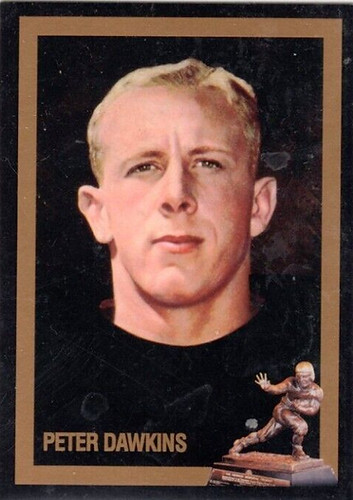
On December 2, 1958, Pete Dawkins was awarded the Heisman Trophy over Randy Duncan of Iowa. Dawkins went on to attend Oxford University as a Rhodes Scholar, where he played for the University’s rugby team for three years. Later, he attended Princeton where he received a MPA and Ph.D.
His military career was equally impressive and he rose to the rank of Brigadier General with commands in both the 82nd and 101st Airborne Divisions. After serving 24 years, Pete retired from the Army and entered the world of business. After several years on Wall Street, he ran for a seat in the U.S. Senate, and subsequently served for over twenty years in executive positions in Primerica Corporation, Travelers and Citigroup.
Pete Dawkins was elected into the College Football Hall of Fame in 1975.
Peter Miller Dawkins (March 8, 1938)

9/27/1958 vs. South Carolina
(W 45-8
(attendance 16,250)

10/11/1958 at Notre Dame
(W 14-2)
(attendance 60,564)
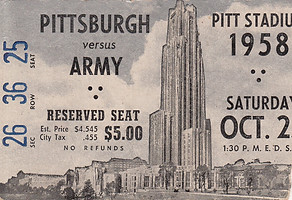
10/25/1958 at Pittsburgh
(T 14-14)
(attendance 50,287)
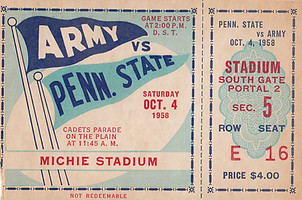
10/4/1958 vs. Penn State
(W 26-0)
(attendance 27,250)

10/18/1958 vs. Virginia
(W 35-6)
(attendance 27,250)

11/1/1958 vs. Colgate
(W 68-6)
(attendance 24,750)
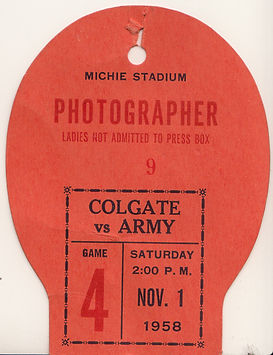

11/8/1958 at Rice
(W 14-7)
(attendance 69,000)
11/1/1958 vs. Colgate (photographers pass)
(W 68-6)
(attendance 24,750)

11/15/1958 vs. Villanova
(W 26-0)
(attendance 27,250)

11/29/1958 vs. Navy
(W 22-6)
(attendance 102,000)
1959 Billy Cannon - Louisiana State
Born in Philadelphia, Miss., Cannon grew up in Baton Rouge, La., where he attended Istrouma High, excelling in football, basketball and track. He chose to play football in college for hometown LSU, picking the Tigers over Florida and Mississippi. In 1957, he was an immediate standout as a sophomore, offensively and defensively. As a junior, Cannon was the driving force behind the Tigers as they carved out a perfect season and captured the 1958 national championship. He passed for a touchdown and kicked the extra point in LSU’s 7-0 win over Clemson in the Sugar Bowl, and earned MVP honors. Cannon’s most memorable performance came in 1959 against Ole Miss. Top-ranked LSU trailed the third ranked Rebels 3-0 early in the fourth quarter, when Cannon fielded a punt at the LSU 11-yard-line and broke seven tackles on his way to paydirt. LSU won the contest 7-3.

Considered one of the best collegiate backs of his era, Billy Cannon was awarded the Heisman Trophy on December 1, 1959. Billy went on to a distinguished career in professional football with the Houston Oilers, the Oakland Raiders and the Kansas City Chiefs. He was named All-Pro halfback with Houston and All-Pro tight end with Oakland. During his pro years, Billy went to dental school at the University of Tennessee, graduating in 1968 with a D.D.S. He continued his studies at a graduate program in orthodontia at Loyola in Chicago, earning two additional degrees. Cannon eventually settled down as an orthodontist in Baton Rouge. He had originally been elected to the College Football Hall of Fame in 1983, but the hall rescinded the honor before his induction due to his confessed involvement in the counterfeiting scheme.
Billy Cannon was re-elected into the College Football Hall of Fame in 2008.
William Abb Cannon (August 2, 1937 - May 20, 2018)

9/19/1959 vs. Rice
(W 26-3)
(attendance 48,613)
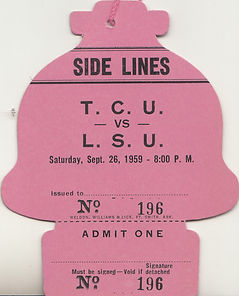
9/26/1959 vs. Texas Christian (sideline pass)
(ticket stub still wanted)
(W 10-0)
(attendance 65,694)

10/3/1959 at Baylor
(W 22-0)
(attendance 32,308)

10/17/1959 at Kentucky
(W 9-0)
(attendance 33,230)

10/31/1959 vs. Mississippi
(W 7-3)
(attendance 67,327)
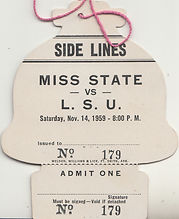
11/14/1959 vs. Mississippi State (sideline pass)
(ticket stub still wanted)
(W 27-0)
(attendance 63,272)

10/10/1959 vs. Miami
(W 27-3)
(attendance 64,864)

10/24/1959 at Florida
(W 9-0)
(attendance 47,578)

11/7/1959 at Tennessee
(L 13-14)
(attendance 45,682)
